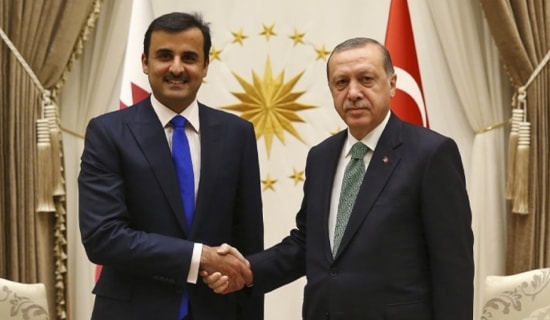On August 9, 2016, Turkish President Recep Tayip Erdogan is set to meet with Russian president Vladimir Putin in St. Petersburg. At the talks, Putin and Erdogan are expected to discuss the lifting of Russia's embargo on Turkish goods, the resumption of chartered flights, construction of the TurkStream gas pipeline, the Syrian peace settlement, the struggle with terrorism, and other issues. Ahead of the meeting, Erdogan said that the talks with Putin "will open up a new page in relations between the two countries." He then added: "It will be a historical visit, a new start. I believe talks with my friend Vladimir will open up a new page in bilateral relations. Our countries have a lot to do together."[1]
The two leaders are going to meet for the first time, since the Turkish air force shot down a Russian plane last November 2015. On June 27, after seven months on tensions between the two countries, Erdogan sent a formal letter of apology to Putin for the death of the downed Russian plane's pilot. In his letter, Erdogan said that Russia is Turkey's friend and strategic partner, and that the Turkish authorities do not want to ruin relations between the two countries. Erdogan wrote: "We never had the desire or deliberate intention of shooting down the Russian Federation plane." The letter continued: "[Turkey] undertook much effort at great risk to retrieve the Russian pilot's body from the Syrian opposition and bring it back to Turkey, where pre-burial procedures were carried out in accordance with religious and military procedures. We performed this work at a level worthy of our two countries' relations. I once again express my sympathy and profound condolences to the family of the Russian pilot who was killed and I apologize to them. I share their grief with all my heart. We look on this Russian pilot's family as we would a Turkish family and we are ready to undertake any initiative that could lessen the pain and severity of the damage caused."Erdogan expressed his deep regret for what happened and said that he is ready to do everything possible to restore the traditionally friendly ties between Turkey and Russia and also to work together to respond to crisis situations in the region and fight terrorism.[2]
On June 29, at Russia's initiative, Putin held a telephone conversation with Turkish President Erdogan, after the latter apologized for downing a Russian military aircraft in November, 2015. The Kremlin's website reported: "Putin said that the letter [of apology] he received from the Turkish President opens the road for overcoming the crisis in bilateral relations and beginning the process of renewing joint efforts on international and regional issues and developing the two countries' relations in different areas...Putin said that he would instruct the Russian Government to begin negotiations with the relevant Turkish agencies to restore mutually advantageous bilateral cooperation in trade, the economy and other sectors."[3]
Commenting on Erdogan's letter to Putin, Russian Vice-Premier Alexander Khloponin said: "This process is complex...I believe that the Turkish side must find very serious and weighty arguments for Russia so that we can review our long-term relations for the better."[4] Federation Council speaker Valentina Matviyenko said although the apologies "are seven months late," it is "the most important event in the normalization of Turkish-Russian relations."[5]
In preparation for the Putin-Erdogan talks, on July 1, Foreign Minister Sergey Lavrov met with Turkish Foreign Minister Mevlut Cavusoglu, at the meeting of the Organization of the Black Sea Economic Cooperation Council of Foreign Ministers in Sochi. The two ministers discussed renewing tourism and stressed the need to restore cooperation in the settlement of regional conflicts, above all in the Syrian crisis. The officials agreed to reactivate bilateral mechanisms of anti-terrorist cooperation with the participation of their countries' foreign services and intelligence agencies.[6] An editorial in Vedomosti, a leading financial paper, commented that the current Russia-Turkey rapprochement is situational since both countries use it to signal the West. Relations with the West are far more important for Russia and Turkey than their mutual relations with each other.[7] In another article Vedomosti quotes Russian Foreign Affairs Council expert Andrey Kortunov, who says that Russia-Turkey contradictions stem from the Syrian issue, Southern Caucasus regional issues and the Crimean Tatar ethical issue. Kortunov said: "I think the sides will discuss all those questions but I assume that the Russian side will want to keep some aces in hand for a further trade-off."[8]
It is worth noting that the meeting between Putin and Erdogan is occurring the day after Putin met with Iran's President Hassan Rouhani and Azerbaijan's President Ilham Aliyev, in Azerbaijan's capital of Baku.
The following is a review of comments in the Russian media, ahead of the Putin-Erdogan meeting:
The Syrian Crisis; FM Lavrov: 'Turkish Territory Is Actively Used To Deliver Supplies To Terrorists And To Transport Fighters To Syria'
One of the talks' main topics between Erdogan and Putin is going to be the settlement of the Syrian crisis. On July 22, Russian Foreign Minister Sergey Lavrov answered to a question on the normalization of Russian-Turkish relation, at Russia's "Terra Scientia" Youth Educational Forum. Lavrov said:
"Here's what I'll say on that. You know how Russia-Turkey relations were faring before November 24, 2015, when a Russian bomber was downed, and you know what happened after that. We believe, and we have said so publicly, that this incident was an example of unacceptable behavior by the Turkish side, no matter who stood behind that illegal act because the bomber was returning to base and had no bombs left after striking terrorists, and it was not downed in Turkish airspace but over Syria. We took a very firm stand on this, because it was actually an unjustified attack.
"We are satisfied that our Turkish partners have heard us, even though it took them seven months, and that the letter President Erdogan sent to Vladimir Putin included the right words, as you know. This allowed us to arrange a phone conversation between the two presidents, during which they agreed to instruct their governments to start normalizing bilateral relations. This work is underway. Regular flights have been resumed today, including those that were suspended because of the attempted coup...
"As for the restoration of trust, this is an abstract category. Everything will depend on how we feel the cooperation and contacts are going. I'm referring not only to bilateral contacts or bilateral trade, not what we will buy from each other, what we will build or what investment projects we will implement jointly. Much will depend on our cooperation in settling the Syrian crisis.
"It so happened that after our bomber was downed and we put a freeze on relations with Turkey, we provided numerous pieces of evidence during discussions on Syria that showed that Turkish territory is actively used to deliver supplies to terrorists and to transport fighters to Syria. This evidence is still on the table. Now that we have resumed our relations, it will be difficult for Turkey to disregard the evidence. We hope that our Turkish partners will answer our questions and also take measures to prevent the use of their territory for keeping up this fratricidal war and for supporting terrorists who are fighting for their own interests and don't care about the future of Syria.
"I recently met with my Turkish colleague, Mevlüt Çavuşoğlu, during a meeting of the Black Sea Economic Cooperation (BSEC) organization in Sochi. I think that our Turkish neighbors understand that we should cooperate more openly and with a greater degree of trust now, also considering that the situation in Syria has significantly changed over the past seven months. Conditions are being created there for defeating terrorists and launching a real intra-Syrian dialogue so that the Syrians themselves decide the future of their country."[9]
Gazeta.ru's Editorialist: Erdogan Wants Guarantees That Russia Will Refuse To Support Syrian Kurds
According to Gazeta.ru editorialist, Vladimir Frolov, Vladimir Frolov, Moscow's hopes for the success of its plans for Aleppo and military victory in Syria depend heavily on the position of Turkey and on Ankara's readiness to block the channels of weapons, fuel and food supply to the Syrian rebels via the Turkish border. Frolov wrote:
"Without some boosting from Turkey, rebellion in North-Western Syria is doomed, and supplies in Eastern Aleppo will only be enough for a few months. Apparently, this will be one of the central subjects during the talks of Vladimir Putin and Recep Erdogan in Saint-Petersburg on August 9. Moscow has made its wishes known to the Turkish side by informing it about the 'humanitarian operation'[10] in Aleppo and expressing hope that Turkey's position will change. But Ankara, too, has something to show Moscow - Erdogan wants guarantees that Russia will refuse to give diplomatic and military support to Syrian Kurds from the Kurdish Democratic Union, whom Turkey considers terrorists to be connected to the Kurdistan Workers' Party (KWP)[11] .
So far, no great changes have been noticed in Turkey's actions on the Syrian axis - the support for the militants continues (one must understand that it may be because of the commitments to the opposition's sponsors - Qatar and Saudi Arabia). Erdogan's goals in Syria have not changed either: the establishment of a moderate Islamist regime headed by Sunnis, close to Erdogan's own Justice and Development Party (AKP). But the timetable and modalities of this transition are something that Ankara is ready to discuss. Before the start of the Russian operation in Syria in September 2015, Erdogan stated that Assad could stay at the helm of Syria for a transitional period of no more than six months. Maybe today there is more flexibility.
One must also be aware of the fact that the failure of the military coup in Turkey and the purges of the top military officials that followed have weakened the restraint on the adventurous character of Erdogan's policy in Syria. It was the military who restrained him several times from direct armed invasion of northern Syria in order to create 'humanitarian areas' for refugees, but in fact - buffer zones for Syrian Kurds. Today Erdogan is probably not in the mood for any invasions, but nobody knows what may happen tomorrow."[12]
Endnotes:
[1] Tass.ru, August 7
[2] Kremlin.ru, June 27
[3] Kremlin.ru, June 29; See MEMRI Special Dispatch No. 6492,Russia This Week - June 20-27, 2016, June 27, 2016
[4] Tass.ru, June 28, 2016.
[5] (Tass.ru, June 29
[6] (Mid.ru, July 1)
[7] Vedomosti.ru, July 27, 2016
[8] Vedomosti.ru, July 27, 2016
[9] Mid.ru, July 22, 2016.
[10] Russia opened three humanitarian corridors in Aleppo for civilians and also for militants, who agreed to lay down their arms. However, the Assad regime's governor of Aleppo province, Mohammad Marwan, said that that militants are blocking people from leaving. (Rt.com, July 29)
[11] This party is better known by the Kurdish acronym PKK.
[12] Gazeta.ru, August 2, 2016.




